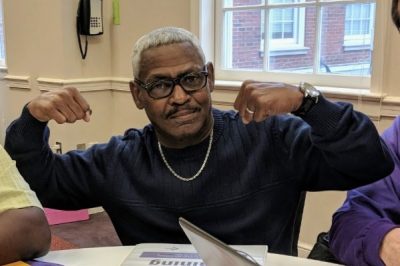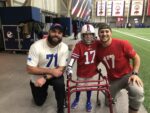Losing One Warrior Affects the Entire Sarcoidosis Community
Written by |

The sarcoidosis community took a serious hit when we learned of fellow warrior Rodney Reese’s passing on Sept. 25. A beloved husband, father, and grandfather, Rodney was also a friend, brother, and father figure to thousands of people living with sarcoidosis. We have lost a cherished member of our family.
When someone is diagnosed with a well-known disease, the patient and their loved ones typically already have some understanding of it. But rare diseases like sarcoidosis involve an extra learning curve. Most of us have never even heard of the disease, so we take to the internet to learn what we can.
One of the first things we often find is that actor and comedian Bernie Mac died from complications of sarcoidosis in 2008. Then, we learn that there is no cure for this rare disease, and it can affect various organs and bodily systems. Suddenly, we’re forced to face our own mortality. Most of us wonder how the disease will affect us, how much time we have left, and what kind of legacy we’ll leave behind.
As we keep searching, though, we find organizations, support groups, and social media pages that connect us with other sarcoidosis warriors. We meet people who reassure us. They have sarcoidosis, but they are living and thriving.
Rodney Reese lived, thrived, and truly embodied the title of “warrior.” Rodney was a tremendous presence in the sarcoidosis community, always finding ways to support others as a friend and mentor. He was one of the original patient ambassadors with the Foundation for Sarcoidosis Research (FSR), he founded his own organization, The Sarcoidosis Awareness Foundation of Louisiana, Inc., and he partnered with the Bernie Mac Foundation and Stronger Than Sarcoidosis on several projects.
Beyond his involvement in these organizations, Rodney was there for anyone living with the disease. In the weeks since his passing, I’ve seen countless posts sharing stories about him, all with one common thread: Rodney made sure everyone he met felt welcome, cared for, and not alone.
I asked a few members of the sarcoidosis community to comment on Rodney’s passing:
“Rodney will always be remembered as a sweet, gentle, caring, strong man that advocated hard for the sarcoidosis community. He also had swag like no other. He may be gone from our sight, but never from our hearts. RIP.” — Cheryl Bradford
“I remember meeting Rodney for the first time in Washington, DC at Rare Disease Week. … He put his arm around my shoulders and said: ‘Baby girl, you are with family now, and you will be alright.’” — Cathleen Terrano
Rodney was charming and debonair, offering strength and compassion to anyone in his presence. He shared his story often to educate both the public and legislative officials about sarcoidosis. He hosted a support group and an annual Fire Truck Pull for a Cure fundraiser in Baton Rouge, Louisiana, and he helped anyone who wanted to get more involved in raising awareness, fundraising, and advocating.
A few weeks ago, I learned that Rodney was in the hospital with COVID-19. He had been vaccinated, but sarcoidosis and the immunosuppressive medications used to treat it can affect a patient’s immune response. Ultimately, we may be more susceptible to the virus and at a higher risk of severe outcomes.
Even from the hospital, Rodney reached out to his sarcoidosis family. He wanted to tell us that he was fighting as hard as he could, and to check if we were OK. As sarcoidosis warrior Frank Rivera shared in a blog post, “That is what Rodney is and was. Always there, always caring, always Rodney!”
Sadly, those of us in the sarcoidosis community frequently read about someone passing; I’ve heard about three others since Rodney. It’s jarring even when we don’t know them personally. As much as we don’t want to think about it, it brings us back to our own mortality, as it could just as easily be us. We are often forced to reflect on our lives and our loved ones.
But when it’s someone like Rodney who has made such an impact, it hits from multiple angles. We’ve lost a friend, a family member, an inspiration.
Now, our community must draw on that inspiration and focus on living with sarcoidosis, not dying from it. We should follow Rodney’s lead and do as much as we can with the life that we have. That is his legacy.
Who and what brings us joy? For both Rodney and me, it includes supporting other sarcoidosis warriors through ups and downs. Today, for me, it starts with this column.
Losing Rodney has been devastating to our whole community, but we keep going — in his memory, in his honor, and in ours.
Rest in peace, Rodney Reese.

Rodney puts his strength on display at the FSR Ambassador Training in 2018. (Courtesy of Kerry Wong)
***
Note: Sarcoidosis News is strictly a news and information website about the disease. It does not provide medical advice, diagnosis, or treatment. This content is not intended to be a substitute for professional medical advice, diagnosis, or treatment. Always seek the advice of your physician or other qualified health provider with any questions you may have regarding a medical condition. Never disregard professional medical advice or delay in seeking it because of something you have read on this website. The opinions expressed in this column are not those of Sarcoidosis News or its parent company, Bionews, and are intended to spark discussion about issues pertaining to sarcoidosis.







Donna Milton
I just read the lovely tribute to Rodney Reese written by Kerry Wong. Then I scrolled down and saw the picture of Rodney, and saw that he was an African-American. That put me in mind of a friend I had at the high school I worked at as the school librarian. My high school is what is termed as an "inner-city" high school. That means most of the student body, and the faculty, was Black. I am not--I am White. I loved that school. (I am now retired.) Anyway, our Athletic Director and Head Football Coach was an African-American. This guy was in tip-top shape, a perfect specimen of superb health. Never got sick. Then, out of nowhere he got so sick he ended up in the hospital. The doctors couldn't figure out what on earth he had. How come this guy was so sick? Well, it took about 2 weeks for the docs, through a process of elimination as usual, to finally narrow it down to sarcoid. But, by then it was too late. Coach died because his strong body was so weakened it couldn't fight off the pneumonia. He was about 40 years old. A good man was gone, leaving a wife and 2 daughters, plus a huge professional family, to a disease no one had heard of. Sarcoidosis--what??? After his death, I did a lot of research on this unheard of disease. According to what I read (this was in the 1980s), sarcoidosis was harder to diagnose in African-American males, and harder to treat in them also. And then, at about this time I was diagnosed with sarcoid. Two of us from the same school--unreal. But, my friend, Coach, is gone due to sarcoid and I am doing my best to spread the word about this disease, especially in the African-American community. RIP, Coach.
🦋 Kerry Wong
Donna, thank you so much for sharing both your and Coach's stories - I'm sorry for your loss, as well. Learning more about the disease and sharing our experiences to raise awareness are so important - that's how we can (hopefully) make it a little easier on those who come after us. And in the meantime, we can connect with each other and know that we are not alone in this.
~🦋